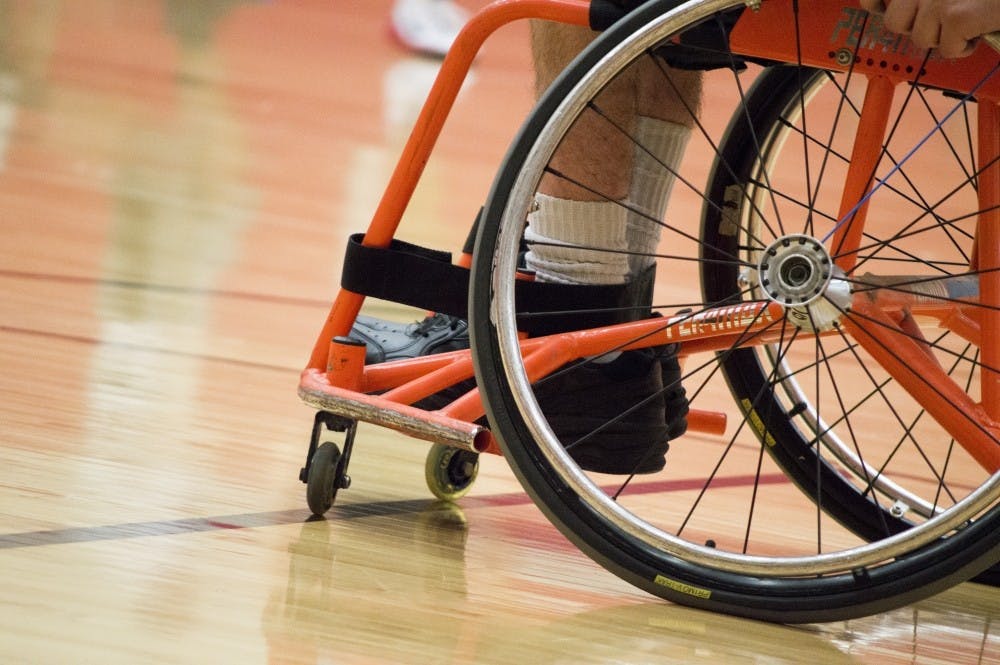When a prospective student considers a college, most think about their area of study, finances, location and extracurricular activities.
However, some students have to think about how they will get to class in the morning or how they will pass a class.
Four Ball State faculty followed prospective, wheelchair-using students and their families to observe challenges they may have while touring, choosing and transitioning to a university from secondary education. The research was done to advise other universities on how to be more attractive for wheelchair users.
Director of Disability Services Larry Markle, professor of Higher Education Roger Wessel, English professor Darolyn Jones and graduate student Christie Blanch oversaw the two-year project, which was published in October 2015.
“We have more wheelchair users than any other school in the state by far and away, and at least double than any of the other schools in the Mid American Conference,” Markle said. “That’s why we’re able to do this research when other universities aren’t — we have so many wheelchair users here.”
About 11 percent of students with disabilities are enrolled in post-secondary education, according to the Ball State study. At Ball State, around 700 students take advantage of the Office of Disability Services.
Ball State tries to be disability-friendly by encouraging students to disclose their disability to the university, which can allow students accommodations for their needs, like extra exam time or professional note-takers.
Because disabilities can range from non-apparent to debilitating, students are offered resources that can tailor to their needs.
The university doesn't provide services to help students get out of bed, use the bathroom or take a shower, but the Office of Disability Services connects students with resources for attendants who will help students get up and moving.
“If you’re not able to get out of bed, if someone is not there to assist you getting out of bed, you may be the brightest student ever, [but] it’s not going to matter if you can’t get to class,” Markle said.
Sophomore psychology major Lizzie Ford has cerebral palsy and is a wheelchair user. She was offered a scholarship to Butler University and planned to attend there until she compared the campus to Ball State's.
“I had a scholarship to Butler, but when I went to visit I couldn’t get around," Ford said. "There were too many lips on curbs, there weren’t enough ramps. It was just hard to get around, even with my power chair."
LaFollette Complex and the Multicultural Center are two buildings Ford has problems accessing. However, the friendly environment and helpfulness of staff makes up for the access issues she experiences, Ford said.
Wessel said it is imperative that universities have a disability-friendly office.
“Just because [Markle] is in this role doesn’t mean he has to be friendly," he said. "In fact, go to some campuses, you’ll get hesitant responses like, ‘Oh, this can be quite expensive.’ They’re not very friendly. So first, is there an advocate for students on campus who really care about helping students? That’s what makes BSU an easy choice."
Independence is important for any student coming to college, with or without a disability. Self-advocacy is a skill necessary for a smooth transition to college, Markle said.
Advocating is tricky because a student with a disability will typically experience a controlled environment and plan throughout high school, which is not the case in post-secondary education.
“I will never do anything to you, for you, about you, without you taking the lead in the process," Markle said. "So the student has to be the one to drive process in college."
Senior interpersonal communications major Sari Hammerstrom has non-apparent disabilities, and she fought to go to Ball State because of accommodations she would not receive elsewhere. She has Attention Deficit Hyperactivity Disorder, dyslexia, dyscalculia and a non-verbal learning disorder.
Ball State wait listed Hammerstrom, and after visiting University of Kentucky, she was determined to get off of the wait list.
“I was driving to school one day and I decided, ‘I’m gonna go to Ball State,’" Hammerstrom said. "So I called, and I made an appointment to let them know I was coming to speak with an admissions officer. I ended up sitting with him and we spoke for 20 minutes. At the end of our conversation, he said, ‘Welcome to Ball State.’"
Hammerstrom said she did not have an good experience in high school. She originally expected to receive a certificate of completion, but worked hard to bring up her GPA to a 2.4.
Going to college was her dream, she said, so she spoke with the guidance counselor who discouraged her from applying to college, and told her to try beauty school instead.
“She told me to try Ivy Tech and she even said, ‘Oh look at your hair, just go to beauty school,’" Hammerstrom said. "She said, ‘College isn’t for everyone, sweetheart.’ And she might have said that to me and never thought about saying that again, but I think about that everyday. And now, I’m a senior and I’m going to graduate."





